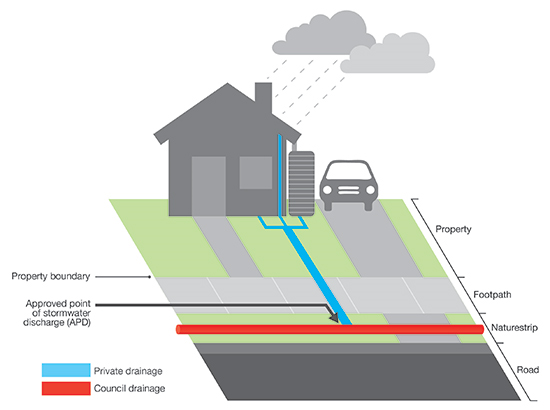Property owners are responsible for all stormwater drainage within their property along with the section of drains from their property to the approved point of discharge.
The Legal Point of Discharge is the point in which private drainage connects to the responsible authority’s drainage system. Stormwater from a building or development needs to be captured and directed to an approved legal point of discharge. Legal points of discharge are connected to public drainage infrastructure, which normally includes:
- underground drains or kerbs within in the street,
- an underground drain within an easement,
- a private drain managed by an owners corporation,
- a Melbourne Water distribution drain, where explicit permission from Melbourne Water needs to be sought

Easements may be within a property to allow a section of land for service assets (including stormwater or sewage pipes). This land is owned and maintained by the property owner, however the assets servicing the easement are the responsibility of the relevant authority (eg. Council, Yarra Valley Water, South East Water, etc.)
Apply for point of discharge
Flooding or water flow issues between adjoining properties should be resolved between the private property owners involved. Should you be experiencing this issue, please refer to our Resolving Drainage with Neighbours for more information.
Stormwater must be connected to a legally approved point of discharge. A point of discharge is usually an underground drain, kerbs or open table drains.
To meet our stormwater drainage requirements for a planning or building permit, please follow these steps:
Step 1: Apply for a stormwater point of discharge certificate
Apply for a stormwater point of discharge certificate
-
Please allow 10 working days for us to assess this application.
-
The construction of an outfall drain to the nearest Council asset may be required.
-
A fee of $144.70 will apply
Step 2: Submit your stormwater drainage plans and computations
Submit your stormwater drainage plans and computations
-
Refer to your planning permit for your stormwater drainage requirements.
-
Please allow 20 working days for us to assess this application.
-
Fees vary from $175 to $1000.
Step 3: Apply for a works within a road reserve permit or a Construction of a Council Asset (Surveillance/Maintenance) Permit
If you are connecting directly to a Council asset, you'll need a Works within a road reserve permit. Alternatively if you are constructing Council drainage to your point of discharge you will need a Construction of a Council Asset (Surveillance/Maintenance) Permit
Apply for a works within a road reserve permit
-
A works within a road reserve permit is required to install any new stormwater connection.
-
Please allow 10 working days for us to assess this application.
-
A fee of $240.50 and security bond (where applicable) of $1000 will apply.
Apply for a Surveillance/Maintenance Permit
- A Survellance/Maintenance Permit is required to construct any new Council drainage
- The fee and bond is dependant on the estimated cost of works. The fee for works under $100,000 is $5500 ($5000 bond and $500 fee). The fee for works over $100,000 is 2.5% of the cost of work plus a bond of 5% of the cost of works.
Apply for works under $100,000 ($5500 payable on application)
Apply for works over $100,000 (You will receive an invoice for payment following submission)
How do I find out if there is a Council drain within my property?
If you have a easement located on your title, there may be a Council drainage asset within your property. If you wish to confirm the type of pipe within your property boundary, you can either lodge a Dial Before You Dig request at 1100.com.au, or contact Yarra Ranges Council on 1300 368 333.
What do I do if I have a pit/drain blocked outside the front of my house?
If you notice a blocked storm water drain, you can report it to the Council’s Infrastructure Maintenance Team. This can be done by submitting a Blocked Drain Maintenance request with Yarra Ranges Council’s Customer Service Team on 1300 368 333.
What stormwater pipes within my property am I responsible for?
Property owners are responsible for all stormwater drainage within their property as well as the section of drains from their property to the approved point of discharge. This includes all stormwater piping up to and connecting to the Council stormwater drain, including house connections within a road reserve.
Council is responsible for drainage infrastructure that is intended for public use which includes pipes and pits located within drainage easements, road reserves and the kerb and channel. This excludes house connections to the road reserve.